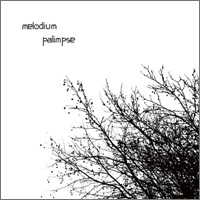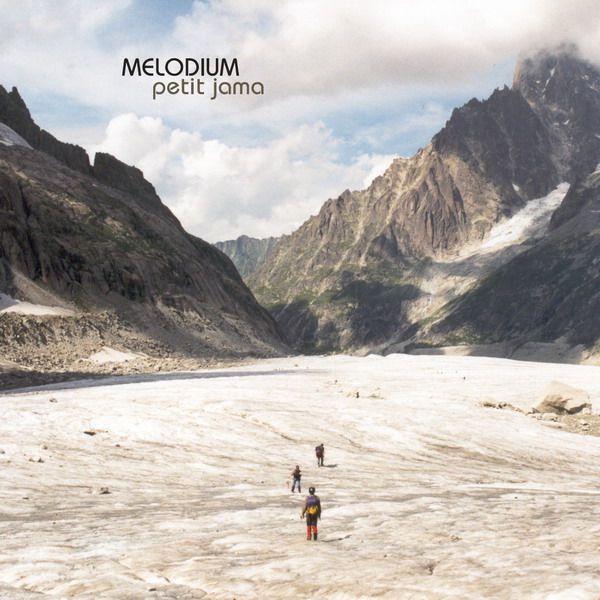
(March 2010) Before listening to the newest Melodium album, I assumed the majority of French musician Laurent Girard’s work followed the blueprint of hallucinatory folk music over scrap book beats that he used so effectively on Music for Invisible People. So I was quite surprised to pop in Palimpse and find 11 tastefully minimal tracks of gently filtered instrumentation, with nary a lyric or drum beat to be heard. The shock was a little off putting at first but my ears were quickly seduced by the nocturnal charm of Girard’s guitar and piano, and I found myself transported to an imaginary pond at dusk with fiery twin suns sinking into the leaf littered waters of half forgotten dreams.
While these compositions are less viscerally enjoyable then the Girard’s energetic interpretation of poppy electronica, they are undeniably beautiful and in a way more emotionally satisfying. Melodium’s music has always hinted at tragedy beneath its bubbly surface, but with a bright and sunny disposition that made the angst seem only half serious. The simple elegance of Palimpse allows this feeling to expand to colossal proportions (without descending into melodrama) until the music takes on the feeling of calm after a storm or the quite strength of an entity surviving their own personal dark night of the soul.
Palimpse is an unusual album not only because it represents a departure from Melodium’s modus operandi, it also has a bizarre track layout. While the liner notes claim 11 tracks; it’s a little misleading. 10 of the songs are brief snippets rarely going over three minute in length, yet the closer “Insomnia” clocks in at just shy of half an hour! As a result Palimpse feels more like two EP’s joined at the hip than one continuous full length. It is an intriguing experiment, I assume attempting to exaggerate the dream-like hypnosis the album inspires, with the listener unsure when one track ends and another begins. Unfortunately, it is more of a distraction than anything else. The songs themselves are all wonderful blends of reversed guitar, haunting piano notes, chopped vocal samples and field recordings, but they end before the listener has an opportunity to fall fully under their spell.
Fortunately “Insomnia” makes up for it in spades. This song has the same basic components as the first half of the album, a sequence of movements derived from a variety of instruments with subtle post production twists, but the distinction of making them all one piece of music makes a profound difference. The segmented nature of the first 10 songs has a wave like quality, with cliffs and valleys that can often be quite jarring. “Insomnia,” on the other hand, is an uninterrupted glacial plain that seems to stretch into infinity. This sonic landscape is much more complementary to the ambient approach Girard is experimenting with, and as a result it is far and away the strongest moment.
At first I was somewhat displeased with this album, finding it one exceptional song with a bunch of half finished sketches shoved in like deleted scenes on a DVD. With each additional listen however, it began to feel as if Girard was making an intentional statement about how the tendency to focus on easily digestible songs hinders music’s potential growth. I may be reading way to deep into this, trying to justify a bunch of filler because I fundamentally want to like this album, but the bottom line is that the more one listen to Palimpse the more it has to offer. Ultimately I suppose it is irrelevant whether Girard is trying to tell us something about the nature of composition or just padding his album, when music is this good it is probably best just to shut up and listen.
Palimpse is out now on Symbolic Interaction. [Info]


























